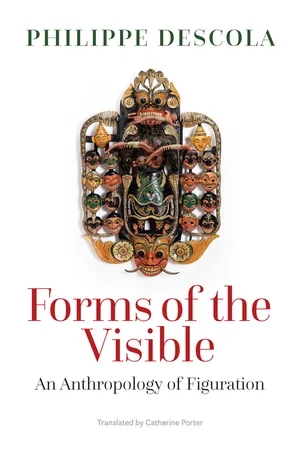
- English
- ePUB (mobile friendly)
- Available on iOS & Android
eBook - ePub
About this book
Imagery and figuration are not just figments of an artist's imagination. Perception and imagination are always shaped by what habit has taught us to discern. The visual path we spontaneously trace through the world depends on where we are situated in the four regions of the ontological archipelago: animism, naturalism, totemism or analogism. Each of these four regions corresponds to a way of conceiving the objects that make up the world, of perceiving the continuities and discontinuities in the folds of the world and of drawing the dividing lines between humans and nonhumans.
From Alaskan Yup'ik masks and Aboriginal bark paintings to miniature landscapes from the Song dynasty and Dutch Golden Age interior scenes: each image reveals, through what it shows or fails to show, a certain figurative regime, identifiable by the formal means it uses and by the device through which it can unleash its power to act. The figurative regime enables us to grasp – sometimes better than words can – the contrasting ways of living that characterize the human condition and its relation to the nonhuman. By comparing a great diversity of visual images and artworks, Descola masterfully lays the theoretical foundations for an anthropology of figuration.
One of the world's leading anthropologists, Philippe Descola has developed a comparative anthropology of relations between humans and nonhumans that has revolutionized both the human sciences and our ways of thinking about the great ecological issues of our time. His new book will be of great value to students and scholars of anthropology, visual art and art history and to anyone interested in art, culture and the relations between the human and nonhuman worlds.
From Alaskan Yup'ik masks and Aboriginal bark paintings to miniature landscapes from the Song dynasty and Dutch Golden Age interior scenes: each image reveals, through what it shows or fails to show, a certain figurative regime, identifiable by the formal means it uses and by the device through which it can unleash its power to act. The figurative regime enables us to grasp – sometimes better than words can – the contrasting ways of living that characterize the human condition and its relation to the nonhuman. By comparing a great diversity of visual images and artworks, Descola masterfully lays the theoretical foundations for an anthropology of figuration.
One of the world's leading anthropologists, Philippe Descola has developed a comparative anthropology of relations between humans and nonhumans that has revolutionized both the human sciences and our ways of thinking about the great ecological issues of our time. His new book will be of great value to students and scholars of anthropology, visual art and art history and to anyone interested in art, culture and the relations between the human and nonhuman worlds.
Frequently asked questions
Yes, you can cancel anytime from the Subscription tab in your account settings on the Perlego website. Your subscription will stay active until the end of your current billing period. Learn how to cancel your subscription.
No, books cannot be downloaded as external files, such as PDFs, for use outside of Perlego. However, you can download books within the Perlego app for offline reading on mobile or tablet. Learn more here.
Perlego offers two plans: Essential and Complete
- Essential is ideal for learners and professionals who enjoy exploring a wide range of subjects. Access the Essential Library with 800,000+ trusted titles and best-sellers across business, personal growth, and the humanities. Includes unlimited reading time and Standard Read Aloud voice.
- Complete: Perfect for advanced learners and researchers needing full, unrestricted access. Unlock 1.4M+ books across hundreds of subjects, including academic and specialized titles. The Complete Plan also includes advanced features like Premium Read Aloud and Research Assistant.
We are an online textbook subscription service, where you can get access to an entire online library for less than the price of a single book per month. With over 1 million books across 1000+ topics, we’ve got you covered! Learn more here.
Look out for the read-aloud symbol on your next book to see if you can listen to it. The read-aloud tool reads text aloud for you, highlighting the text as it is being read. You can pause it, speed it up and slow it down. Learn more here.
Yes! You can use the Perlego app on both iOS or Android devices to read anytime, anywhere — even offline. Perfect for commutes or when you’re on the go.
Please note we cannot support devices running on iOS 13 and Android 7 or earlier. Learn more about using the app.
Please note we cannot support devices running on iOS 13 and Android 7 or earlier. Learn more about using the app.
Yes, you can access Forms of the Visible by Philippe Descola, Catherine Porter in PDF and/or ePUB format, as well as other popular books in Social Sciences & Anthropology. We have over one million books available in our catalogue for you to explore.
Information
Table of contents
- Cover
- Table of Contents
- Dedication
- Title Page
- Copyright
- Preface
- 1. The Folds of the World
- PART I Presences
- PART II Indices
- PART III Correspondences
- PART IV Simulacra
- Conclusion: Making Images
- Postscript: Scaffoldings
- Acknowledgments
- References
- Index
- End User License Agreement